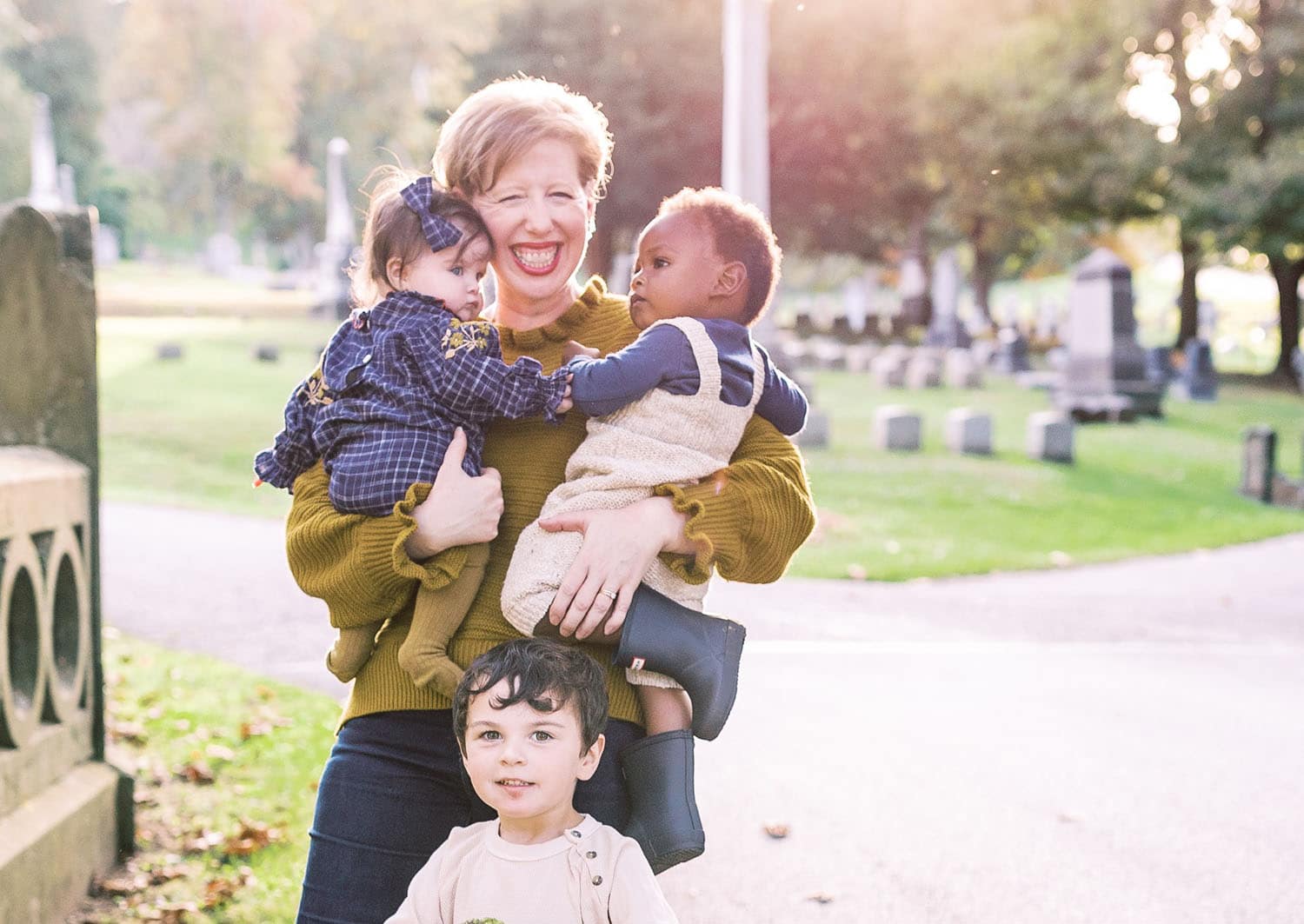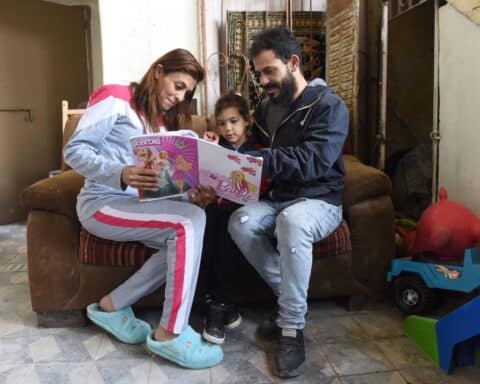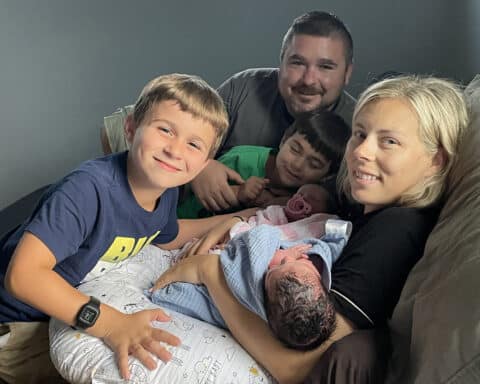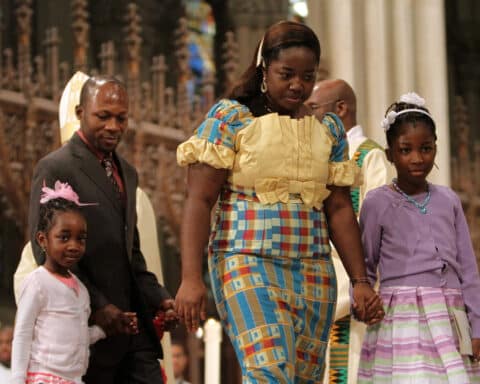For Emily Stimpson Chapman, an adoptive mother of three, adoption reflects God’s relationship with humanity.
“God calls us as children by adoption, so adoptive families are an image of God’s relationship with the human race,” the Catholic wife, mother and writer said. “Our relationship with God is complicated and challenging, so the same is true for adopted families — but it’s a glorious thing to be the image of God’s relationship with us in the world.”
Stimpson Chapman spoke with Our Sunday Visitor about the joys and challenges of adoption in November, National Adoption Month, and ahead of National Adoption Day on Nov. 18. The 48-year-old located in Pittsburgh, Pennsylvania, frequently writes about her family and adoption on her Substack newsletter and in Instagram posts.
She and her husband, Chris, ended up adopting three newborns within three years. Today, Toby is 5 years old, Becket is 3, and Ellie is 2.
“My husband and I were not able to conceive,” she shared, “and we married a little bit older, so we knew that conceiving might be a challenge.”
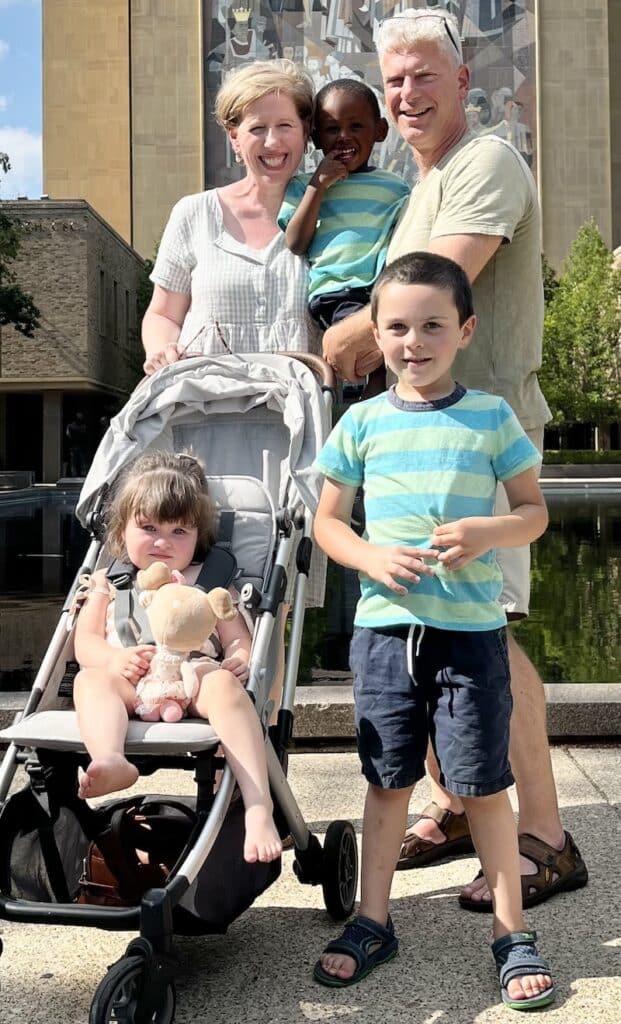
Even before marriage, they considered and prayed about the possibility of adoption, she said.
“After we weren’t able to conceive,” she said, “we grieved that, that was an incredibly hard experience. But it came down to, for us, what mattered more to us: Being pregnant or being parents?”
They chose being parents.
“Very quickly after that,” she said, “God just started handing us baby after baby.”
The challenges of adoption
Stimpson Chapman delved into some of the challenges of the adoption process. While she said that they are different for everyone, she pointed to financing as a hurdle for every couple.
“Adoption is, especially if you do private infant adoption, it is a very expensive process,” she said. “I think that leads many people to think they can’t do it.”
According to the Child Welfare Information Gateway, which falls under the U.S. Department of Health and Human Services, a private adoption conducted outside foster care can range $30,000 to $60,000 while an intercountry adoption runs between $20,000 and $50,000.
At the same time, Stimpson Chapman stressed hope: She has seen that, if God is calling a couple to adoption, he will provide the means to do it.
“We never thought we’d be able to afford one adoption, let alone three,” she said. “I’ve seen so many friends think that it was beyond their reach, and somehow God made it happen.”
Some couples, she said, have other concerns. They worry that they will be unable to love the child as their own. The adoption process is also daunting because of the amount of paperwork.
But, first and foremost, Stimpson Chapman pointed to the grief of adoption that impacts everyone involved.
“The real challenge, once you get into it, is realizing that your motherhood is made possible by another woman’s grief and another family’s grief,” she said. “Adoption is not a joyful process. It is a hard, emotionally-grueling process where you are watching one woman make the hardest decision she will ever have to make and grieve that she is not going to raise her child.”
She emphasized the importance of having the right priorities.
“You have to realize adoption is not about the fulfillment of your desire for a child,” she added. “It is about doing what is best for a child and making yourself available for a mother to choose you to parent her child and God to entrust the child to you.”
The joys of adoption
Stimpson Chapman stressed that the joys of adoption are similar to the joys of regular parenthood.
“You get a baby, you get a beautiful baby who’s the image of God, and who’s been entrusted to you and that stretches you and shapes you and grows your love,” she described.
Adoptive parents, she said, sometimes learn certain lessons faster than other parents.
“No matter if you give birth to a child or adopt a child, that child is not your own,” she said. “That child is God’s. They have their own decisions to make and their own path to walk. They are not going to be another mini you.”
Advice for couples considering adoption
Stimpson Chapman shared her advice for couples who are considering adoption, beginning by researching and educating themselves.
“Talk to adoptive parents,” she recommended. “Talk to, if you can, birth mothers and adult adoptees.”
For those struggling with infertility, she encouraged them to seek healing.
“You’ve got to do some healing work before you move on to adoption,” she said. “It doesn’t mean you’re not going to be sad about not having been pregnant by the time you move on to adoption, but you can’t see adoption as a lesser choice or a secondary choice.”
Instead, she said, couples need to see adoption as an invitation to love in a unique way — a gift.
Ways to support adoptive families
She also shared ways to support families that adopt children.
“If people you know are adopting and they’re having a fundraiser, contribute to the fundraiser. If they’re not having a fundraiser, see if you can throw one for them,” she said, citing the high cost of adoptions.
Small things help, from meals to gift cards for Uber or other rideshare services, especially in the many cases where the families need to travel for their new child.
People should also be sensitive with how they approach the topic of adoption.
“Just being respectful,” Stimpson Chapman said. “Don’t ask questions in front of the child about the adoption if you can avoid it.”
People should never ask the children “Why didn’t your birth mother want you?” or “Is she your real mom?” or ask the parent “Are these your real children?”
The beauty from brokenness
Stimpson Chapman ended by urging the importance of compassion for and awareness of the brokenness of adoption.
“Adoption is wonderful,” she said. “But there’s only a need for adoption because we live in a broken world and adoption always starts in brokenness.”
“If you’re entering into it after struggling from infertility, there’s brokenness in you,” she explained. “There is brokenness in the birth parents who would not be placing their child if they were not in a difficult place. And there’s brokenness in the child who’s separated from their mother.”
“God has been so good,” she concluded, “to bring such beauty out of the brokenness of all of our situations.”

